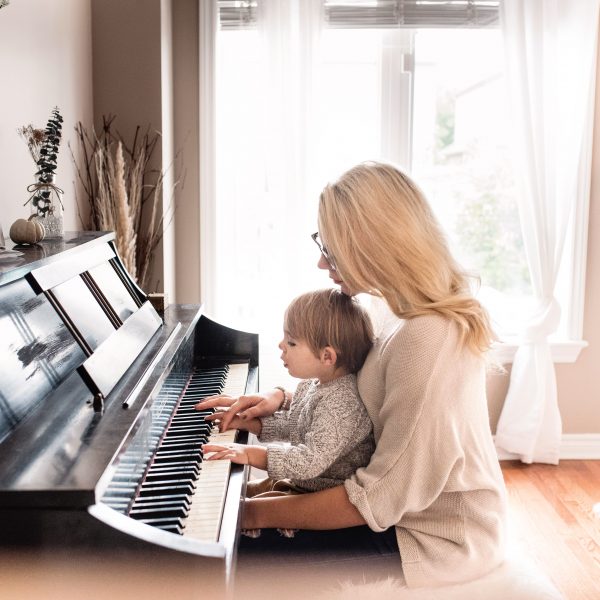More than just background – music is vital for growing baby brains

Many early childhood education and care services offer supplementary programs for children ages two years and up, offering children the opportunity to participate in sports, dance, drama, technology, art appreciation and other experiences from specialist providers who visit the centre.
Unfortunately for children under two years of age, they are often excluded, based on a belief that such programs aren’t suitable, or don’t have value for children who are not yet verbal or able to follow instructions and participate in a programmed activity.
“Many services exclude babies from their programs because they underestimate the value to their development,” Jenny Wilkinson from hey dee ho educational services said.
“There’s this mistaken belief that babies just ‘sit there,’ and sometimes adults think that they are not engaged or learning but in fact they are taking in every second.”
hey dee ho offers programs for children of all ages, right from birth, offering children the chance to engage in music, yoga, fitness, storytelling and drama with qualified program leaders who are specialists in their fields, many with backgrounds in performance themselves.
Music, Jenny said, is a particularly important aspect of cognitive development, gross and fine motor skills, socialisation, connection to caregivers, and creativity and self expression for babies.
Speech and language growth
“Research has shown that listening to and making music enhances speech processing and recall in babies and young children.,” she continued.
“There are also a number of studies which show that the connection between music and speech is a strong one, and that both music and speech help children to develop the capacity to distinguish between auditory nuances.”
When children are learning to speak, and to understand speech, understanding subtle differences in sound (such as between the sound of the letter M and the sound of the letter N) is important, and this skill can be developed while listening to and creating music.
Mathematical connections
Research also suggests that children engaging with music from an early age are priming their brains to connect with mathematical concepts. Both mathematics and music rely heavily on patterns, and engaging with music helps children to develop counting ability and spatial awareness which is vital for early mathematical concepts.
Physical development
Of course, it’s very difficult to not move in response to good music, and for babies, it’s no different. Dancing and moving in response to music helps infants and young toddlers to develop muscles, core strength and balance, as well as getting their bodies ready for bigger movements like jumping, hopping and skipping.
Children love to immerse themselves in music in many ways. They can engage in body percussion by clapping their hands, stamping their feet or tapping on different body parts.
Simple percussion instruments like bells, shaker eggs and tambourines add to the experience and help demonstrate different musical concepts. Moving to music with scarves or ribbons encourages creative expression, all the while developing fine and gross motor skills, preparing their muscles for other activities like drawing and writing.
Socialisation and connection
Music is an inherently social activity, and it is no different for babies and toddlers. As well as the emotional responses which the music itself evokes, inspiring children to feel a full spectrum of emotion from sorrow to joy, the experience of interacting with others while listening to and/or playing music can support self regulation through observation and through helping children to identify their own emotional range.
Research has also shown that the experience of singing songs with others can also support self-regulation by helping young children identify their own emotions as they grow, which is another skill associated with positive social relationships.
Creativity and self expression
Music appears to promote neurobiological processes and neuronal learning in the human brain, researchers have found, and exploring music has been shown to stimulate the parts of the brain which are associated with creativity and self expression, especially in the prefrontal cortex.
The director of The Music Intelligence Lab at Georgia Tech, Parag Chordia, with support from the National Science Foundation is researching the neurological process behind creativity, and has found that music is a key element behind that process.
Chordia argues that subjects like math and science can become abstract quickly and to help people relate to it easily, reference points need to be created. Mathematical concepts can be designed around music, he explains.
Creating connections
Perhaps one of the most powerful reasons for including babies in creative programs such as the music, yoga, fitness, storytelling and drama opportunities offered by hey dee ho is the opportunity for meaningful connections between babies and their caregivers.
Music, especially, is a powerful bonding tool. As babies sway, bounce, move their hands, sing and make vocalisations, their caring adults notice their responses, and join in with an encouraging smile, some kind words, or some copied movements.
This helps babies to learn that their communication attempts are valuable and noticed, that they are in a space where they are cared for, and that they are a part of a community.
Spending time making and responding to music gives caring adults and children time with one another in a low pressure environment, where joyful self expression is encouraged.
Educators and leaders already using hey dee ho are impressed by the difference the programs make, supporting children and educators to connect with one another and build strong relationships, and helping children to develop emotional regulation, an appreciation for music and art, and most of all, to have fun while learning.
To learn more about hey dee ho’s range of programs email [email protected], phone 1300 139631or visit the hey dee ho website.
Popular

Policy
Practice
Quality
Provider
Research
Safety starts with supervision: responding to real risks in ECEC
2025-07-07 10:30:58
by Fiona Alston

Policy
Provider
Practice
Quality
Jay Weatherill appointed to co-lead urgent review into childcare safety in Victoria
2025-07-07 07:24:04
by Fiona Alston

Practice
Provider
Quality
Research
Workforce
New activity booklet supports everyday conversations to keep children safe
2025-07-10 09:00:16
by Fiona Alston













